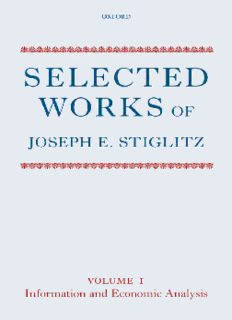Table Of ContentSELECTED WORKS
OF JOSEPH
E. STIGLITZ
This page intentionally left blank
..........................................................................................................................
SELECTED WORKS
OF JOSEPH
E. STIGLITZ
volume i
:
information and
economic analysis
..........................................................................................................................
JOSEPH E. STIGLITZ
1
3
GreatClarendonStreet,Oxfordox26dp
OxfordUniversityPressisadepartmentoftheUniversityofOxford.
ItfurtherstheUniversity’sobjectiveofexcellenceinresearch,scholarship,
andeducationbypublishingworldwidein
OxfordNewYork
AucklandCapeTownDaresSalaamHongKongKarachi
KualaLumpurMadridMelbourneMexicoCityNairobi
NewDelhiShanghaiTaipeiToronto
Withofficesin
ArgentinaAustriaBrazilChileCzechRepublicFranceGreece
GuatemalaHungaryItalyJapanPolandPortugalSingapore
SouthKoreaSwitzerlandThailandTurkeyUkraineVietnam
OxfordisaregisteredtrademarkofOxfordUniversityPress
intheUKandincertainothercountries
PublishedintheUnitedStates
byOxfordUniversityPressInc.,NewYork
©JosephE.Stiglitz2009
Themoralrightsoftheauthorshavebeenasserted
DatabaserightOxfordUniversityPress(maker)
Firstpublished2009
Allrightsreserved.Nopartofthispublicationmaybereproduced,
storedinaretrievalsystem,ortransmitted,inanyformorbyanymeans,
withoutthepriorpermissioninwritingofOxfordUniversityPress,
orasexpresslypermittedbylaw,orundertermsagreedwiththeappropriate
reprographicsrightsorganization.Enquiriesconcerningreproduction
outsidethescopeoftheaboveshouldbesenttotheRightsDepartment,
OxfordUniversityPress,attheaddressabove
Youmustnotcirculatethisbookinanyotherbindingorcover
andyoumustimposethesameconditiononanyacquirer
BritishLibraryCataloguinginPublicationData
Dataavailable
LibraryofCongressCataloginginPublicationData
Dataavailable
TypesetbySPIPublisherServices,Pondicherry,India
PrintedinGreatBritain
onacid-freepaperby
AntonyRoweLtd.
ISBN 978–0–19–953370–1
13579108642
ontents
C
.....................................
PrefacetoTheSelectedWorksofJosephE.Stiglitz ix
Acknowledgements lxii
IntroductiontoVolumeI 1
PART I. PERSPECTIVES ON INFORMATION
ANALYSIS
1. InformationandEconomicAnalysis 29
2. InformationandtheChangeintheParadigminEconomics 53
PART IIA. THE GENERAL THEORY
OF SCREENING
IntroductiontoPartIIA 97
3. TheTheoryof“Screening,”Education,andtheDistribution
ofIncome 99
4. AModelofEmploymentOutcomesIllustratingtheEffect
oftheStructureofInformationontheLevelandDistribution
ofIncome,withMichaelRothschild 122
PART IIB. THEORY OF SELF-SELECTION
IntroductiontoPartIIB 129
5. EquilibriuminCompetitiveInsuranceMarkets:AnEssayonthe
EconomicsofImperfectInformation,withMichaelRothschild 141
6. CompetitionandInsuranceTwentyYearsLater,with
MichaelRothschild 160
7. Monopoly,Non-LinearPricingandImperfectInformation:The
InsuranceMarket 168
vi selectedworksofjosephe. stiglitzvoli
8. PricesandQueuesasScreeningDevicesinCompetitiveMarkets 193
9. SortingOuttheDifferencesBetweenScreeningand
SignalingModels,withAndrewWeiss 223
PART IIC. THEORY OF ADVERSE SELECTION,
EFFICIENCY WAGES, AND CREDIT RATIONING
IntroductiontoPartIIC 259
10. CreditRationinginMarketswithImperfectInformation,
withAndrewWeiss 262
11. EquilibriumUnemploymentasaWorkerDisciplineDevice,
withCarlShapiro 287
12. TheCausesandConsequencesoftheDependenceof
QualityonPrice 304
PART III. THEORY OF INCENTIVES AND
ECONOMIC ORGANIZATION
IntroductiontoPartIII 355
13. IncentivesandRiskSharinginSharecropping 361
14. Information,Competition,andMarkets,withBarryNalebuff 400
15. HumanFallibilityandEconomicOrganization,withRaajSah 409
16. TheBasicAnalyticsofMoralHazard,withRichardArnott 417
17. CreditMarketsandtheControlofCapital 444
18. PeerMonitoringandCreditMarkets 464
PART IV. INFORMATION AND PRICES
IntroductiontoPartIV 481
19. InformationandCompetitivePriceSystems,
withSanfordGrossman 484
20. BargainsandRipoffs:AModelofMonopolistically
CompetitivePriceDispersion,withStevenSalop 493
21. OntheImpossibilityofInformationallyEfficientMarkets,
withSanfordGrossman 516
22. ANonconcavityintheValueofInformation,withRoyRadner 537
contents vii
PART V. WELFARE ECONOMICS OF
INFORMATION
IntroductiontoPartV 557
23. ExternalitiesinEconomieswithImperfectInformation
andIncompleteMarkets,withBruceGreenwald 559
24. MoralHazardandNonmarketInstitutions:Dysfunctional
CrowdingOutorPeerMonitoring?withRichardArnott 589
PART VI. INFORMATION AND MACRO
ECONOMICS
IntroductiontoPartVI 607
25. InformationalImperfectionsintheCapitalMarket
andMacroeconomicFluctuations,withBruceGreenwald
andAndrewWeiss 609
26. FinancialMarketImperfectionsandBusinessCycles,
withBruceGreenwald 617
Bibliography 649
IndexofNames 689
IndexofSubjects 694
This page intentionally left blank
reface to he elected orks of
P T S W
oseph tiglitz
J E. S
.........................................................................................................................
These six volumes bring together my major scientific papers in economics, written
overthepastalmost40years.Whilethesepapershavespannedawiderangeoftopics
and fields, there is a unifying theme behind a large proportion: the standard eco-
nomicmodel(theneoclassicalmodel,basedonrational,fullyinformedhouseholds
maximizingtheirutilityandrational,fullyinformedfirmsmaximizingtheirmarket
valueinteractinginperfectlycompetitivemarkets)isbadlyflawed,sobadlyflawedas
to provide little understanding of what actually happens in a market economy and
littleguidanceaboutwhatpolicieswillincreaseeconomicefficiencyandsocietalwell
being.
A large fraction of the papers focus on a particular assumption—that of perfect
information,ormoreprecisely,ontheassumptionsthat(a)allindividualshavethe
same information; and (b) nothing that occurs within the economy has any effect
on the information (beliefs) of market participants. Of course, no economist could
seriouslybelieve in either assumption;butthey had been at the center of economic
analyses for more than 200 years, taken so much for granted that they were not
1
typically even noted as assumptions. It was not that economists were so foolish as
tobelievethattheseassumptionsprovidedanaccuratedescriptionoftheworld;but
rather,theydidnothavethetoolswithwhichtheycouldanalyzeamarketeconomy
withimperfectinformation—oratleastnotanalyzeitwithanymathematicalrigor.
Sotheyformulatedprecisemodelswithperfectinformation—andtheythenmadea
leap of faith, that a world in which information was not too imperfect would look
not too different from the world of perfect information. The papers presented here
show that that faith was misplaced—even a little bit of imperfect information can
havelargeconsequences.Indeed,noneofthemostbasicpropositionsofeconomics
provedrobust.
TherewereotherassumptionsintheneoclassicalframeworkthatIcallintoques-
tion in the papers collected here: the existence of a complete set of markets (such
that individuals could buy insurance, for instance, against any risk), perfect capital
markets(suchthatanyindividualcouldborrowasmuchass/hewantedattherisk-
adjusted market rate of interest), perfect competition (such that all firms faced a
horizontaldemandcurvefortheirproducts),andafixedtechnology(justasnothing
the firm did affected information, so firms could not invest in research that would
affecttechnology)wereallassumptionsofthestandardWalrasianmodel.(Thefailure
1 Forinstance,inGerardDebreu’sclassicformulationofthecompetitiveequilibriummodel,helisted
tenassumptions.Theinformationassumptionswerenotonthelist(Debreu1959).
Description:This is the first volume in a new, definitive, six-volume edition of the works of Joseph Stiglitz, one of today's most distinguished and controversial economists. Stiglitz was awarded the Nobel Prize in Economics in 2001 for his work on asymmetric information and is widely acknowledged as one of the

